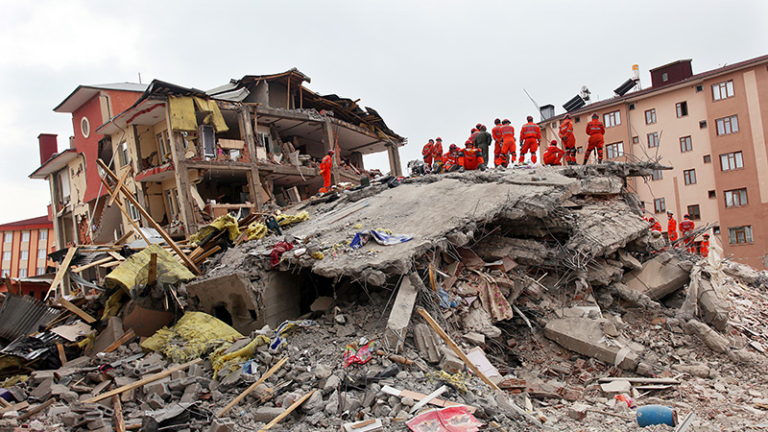
On February 6, a devastating magnitude 7.8 earthquake struck southern Turkey and northern Syria, leaving death and destruction in its wake. People in other parts of both countries felt it, as did some in Lebanon, Palestine, Israel, Jordan, and Egypt. Hundreds of aftershocks, some approaching the magnitude of the original tremor, have been recorded. Tragically, the number of deaths in Turkey and Syria has surpassed 22,000, and tens of thousands of unfortunate others have been injured. These numbers are certain to increase as time passes and the hope of finding survivors fades. Hundreds of thousands of Turks and Syrians have become homeless in the wake of this horrific disaster and are now trying to find refuge from both the devastation and the harsh winter cold.
Many cities and neighborhoods in Turkey and Syria have either been destroyed or damaged to the point of making them uninhabitable. Rescue efforts in both countries commenced as soon as the earthquake struck, but quickly proved inadequate to save all those who remain buried under the rubble of countless buildings. And as the hours and days pass, it becomes less and less likely that rescuers will reach them in time.
Many of those killed in Turkey were refugees from Syria, driven across the border by more than a decade of war. And many of the dead on the Syrian side were internally displaced persons living in unsafe structures, unprepared for what nature might bring. They had already suffered for years from cold, rain, snow, floods, poverty, and unsanitary living conditions. Now they face yet another challenge, one that may seem to many to be insurmountable.
More than two dozen countries and countless international and nongovernmental organizations have promised and supplied rescue teams to find survivors and provided necessary aid for those affected by the disaster. Aid shipments are certainly welcome assistance to address the humanitarian situation in both Turkey and Syria. But the first UN aid convoy to northern Syria did not arrive until four days after the initial earthquake, a delay that was in large part due to political reasons that impeded delivery. Donors and those who are able to influence decisions about aid deliveries must be firmly reminded that humanitarian assistance cannot and should not be subject to political considerations.
There is no justification for politicizing humanitarian assistance, especially at this calamitous time. All Syrians, both in regime-controlled areas and in areas under the sway of anti-regime forces, deserve and must receive necessary humanitarian assistance. US and international sanctions on the Syrian regime for the crimes it has committed against its people should not be used as a pretext for failing to distribute aid to the country. But at the same time, the regime must not be allowed to exploit the current circumstances to escape said sanctions. The United Nations, donor states, civil society organizations, and local stakeholders should be allowed to supervise the fair and just distribution of aid without restrictions or conditions.
The same must be said of future aid and assistance marked for reconstruction efforts, once the task of rebuilding these devastated areas commences. The Syrian regime will undoubtedly again use the pretext of aid to try to escape accountability and international sanctions, and therefore must be prevented from benefiting from the situation. But above all, it must be stressed that all those affected, Syrians and Turks alike, deserve the entire world’s help to rebuild their lives at this incredibly difficult time.
To contribute to the relief efforts, visit Charity Navigator for a list of charities providing earthquake relief and recovery in Turkey and Syria.
The views expressed in this publication are the authors’ own and do not necessarily reflect the position of Arab Center Washington DC, its staff, or its Board of Directors.
Featured image credit: Shutterstock/Prometheus72


